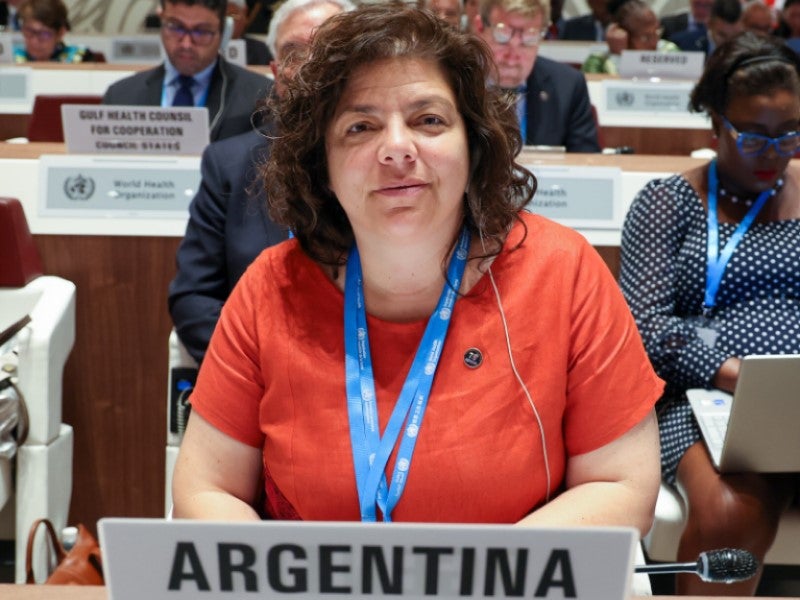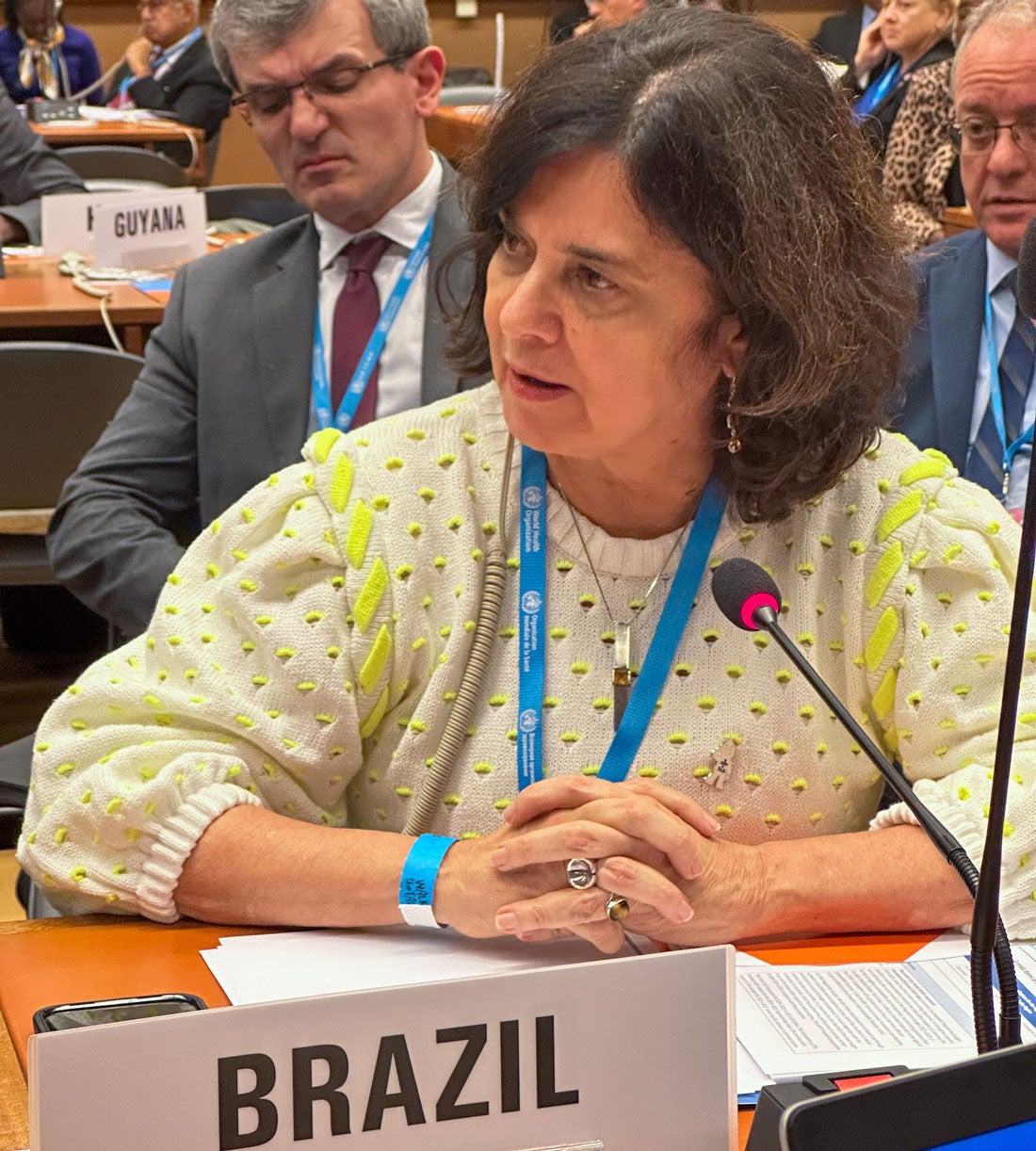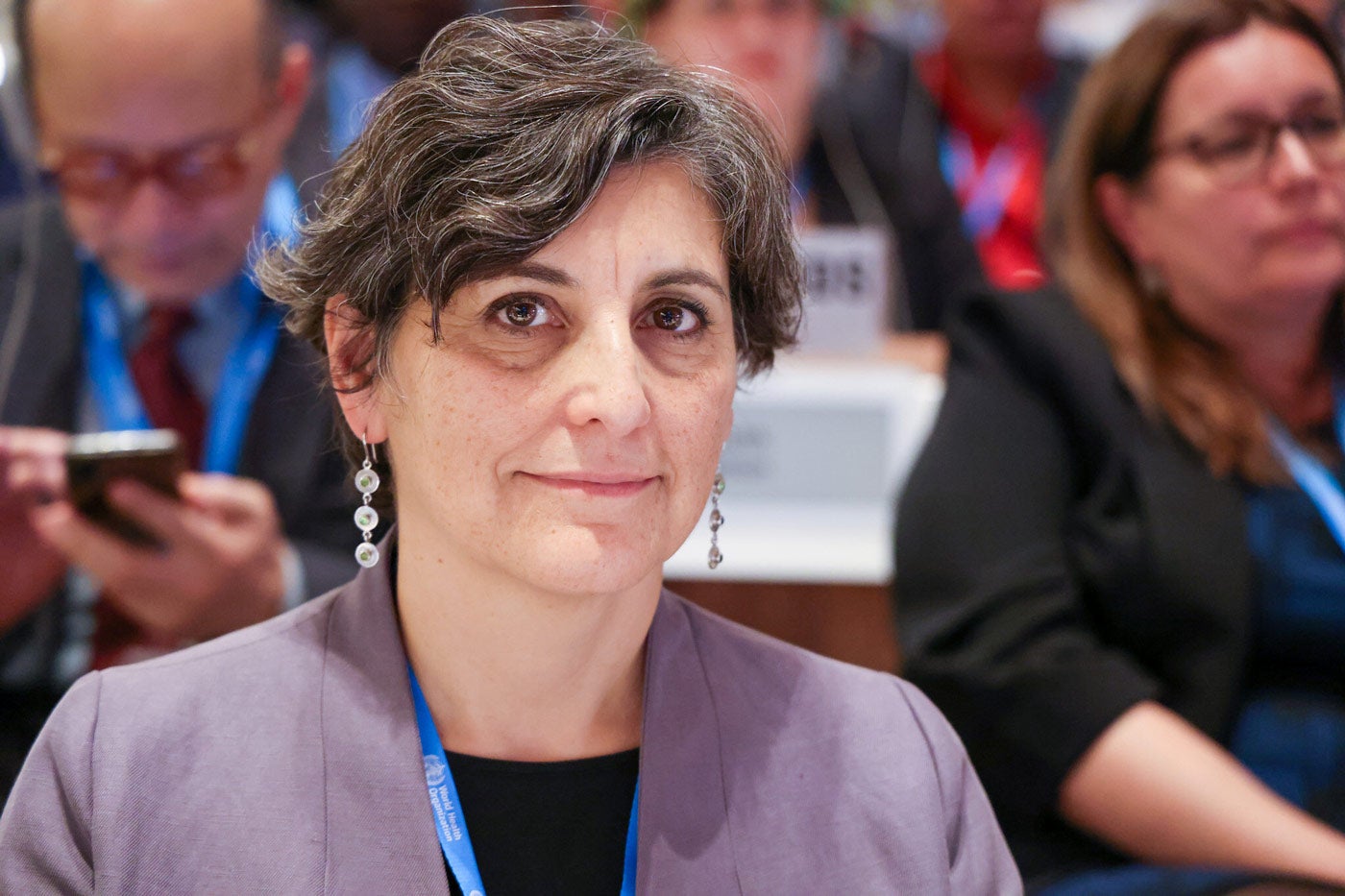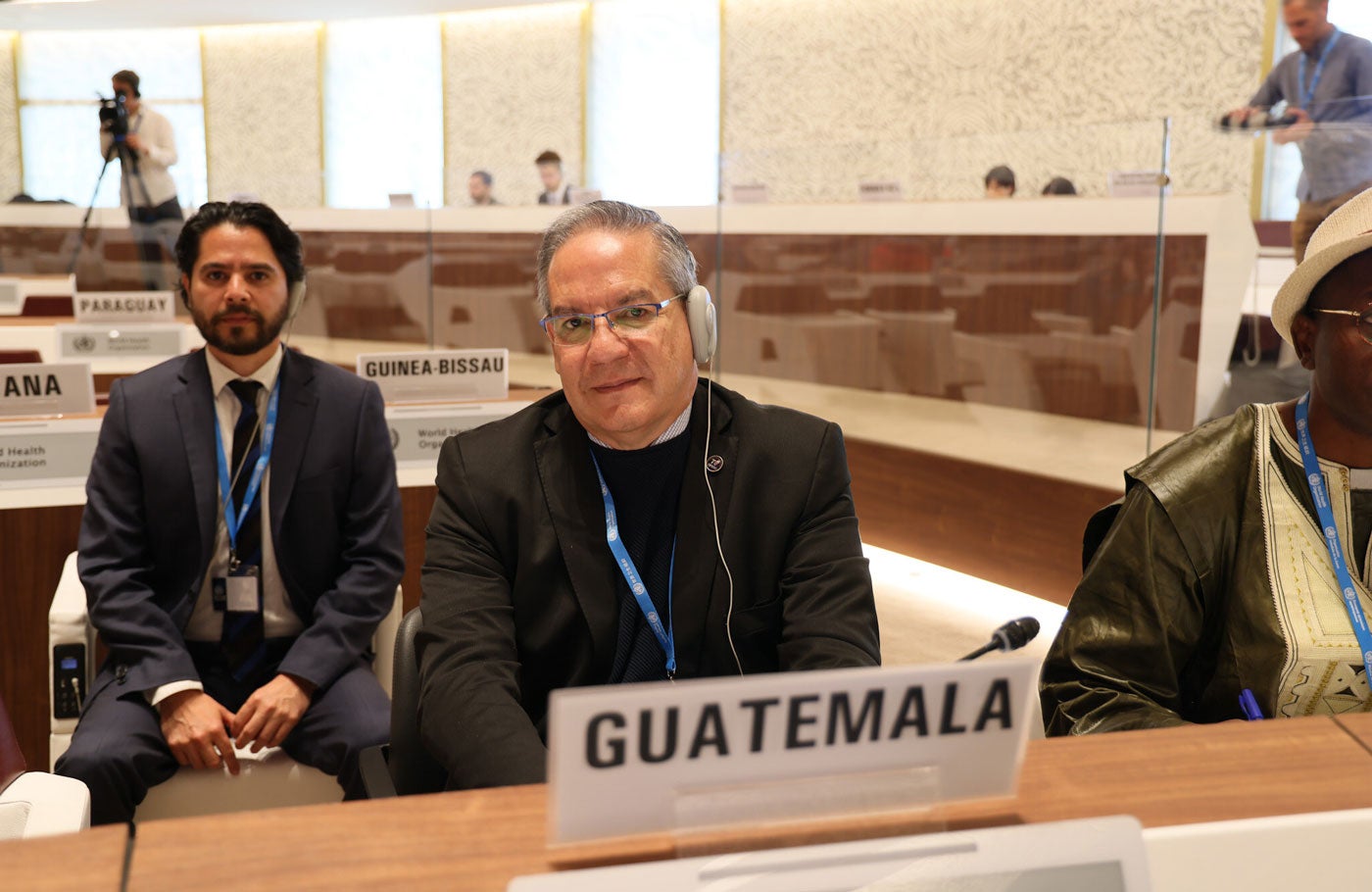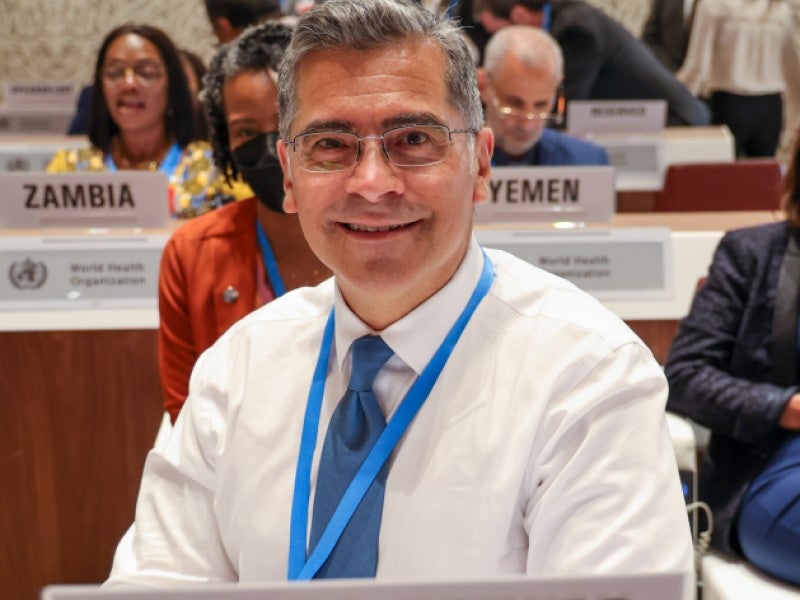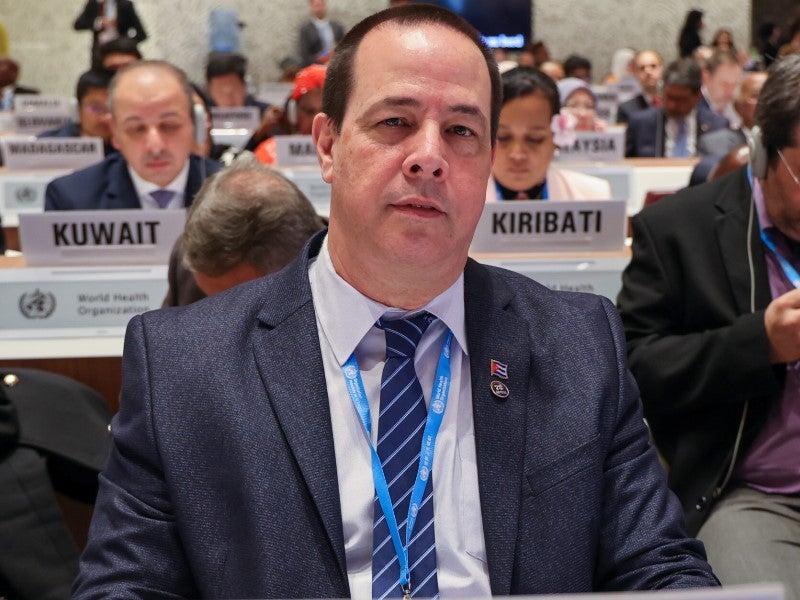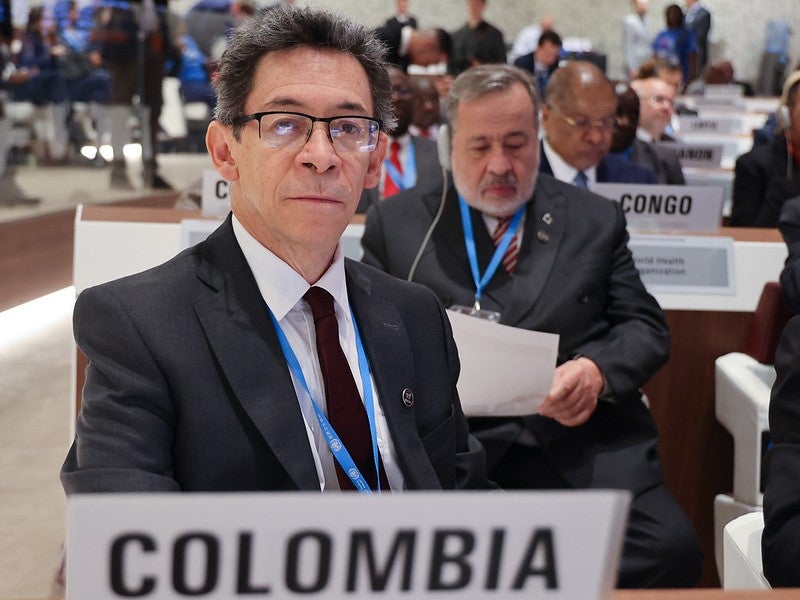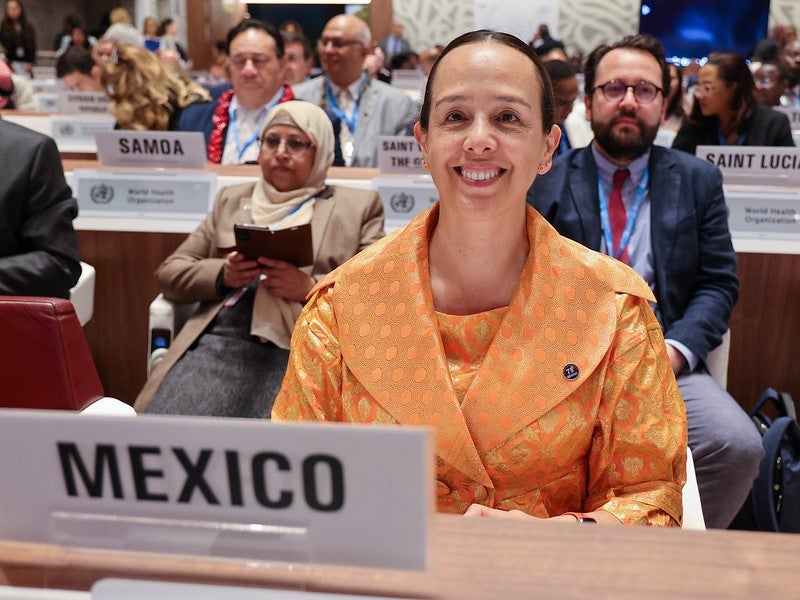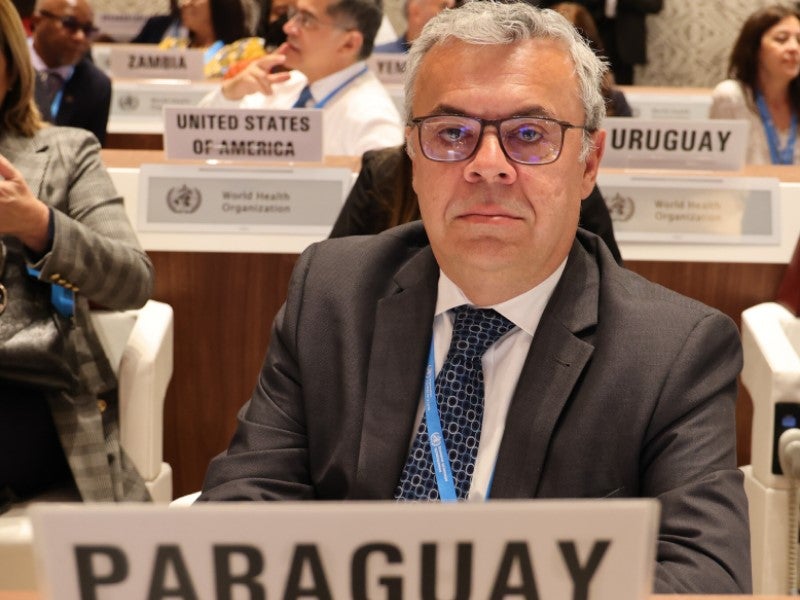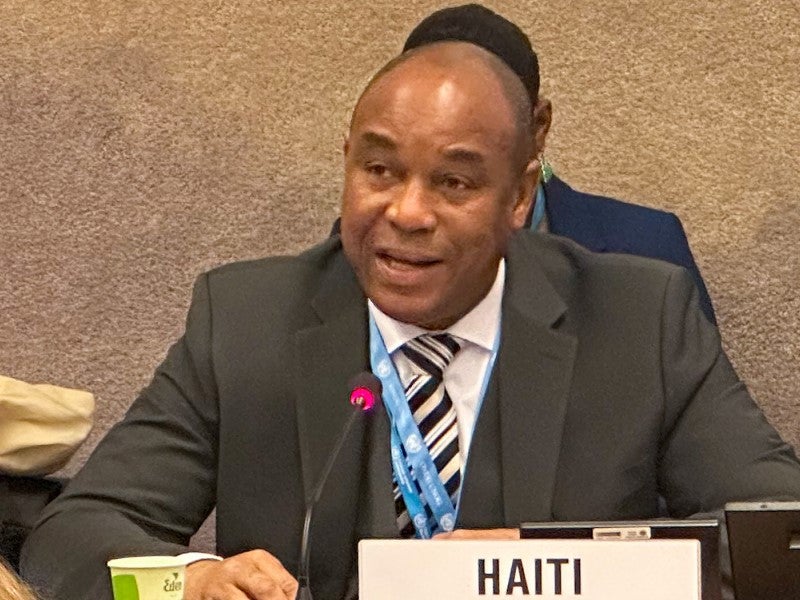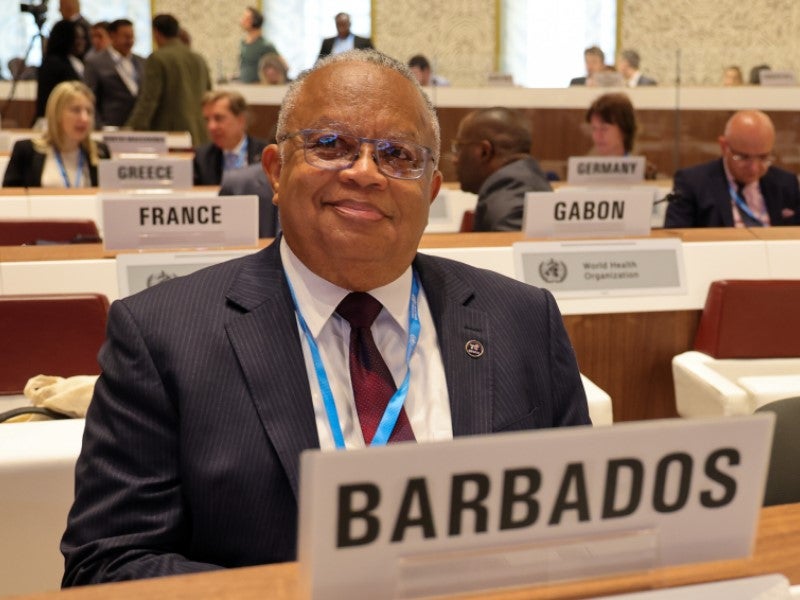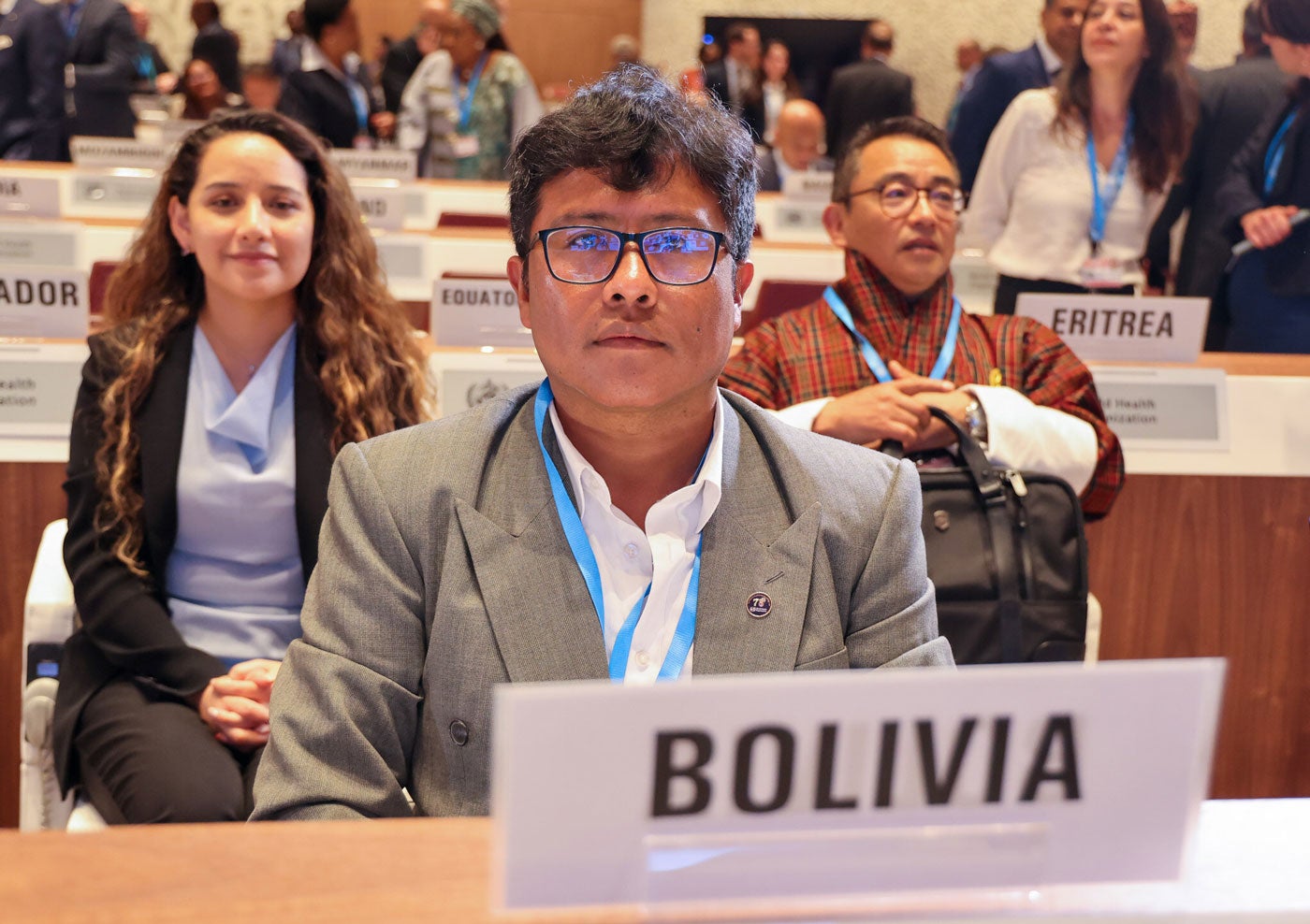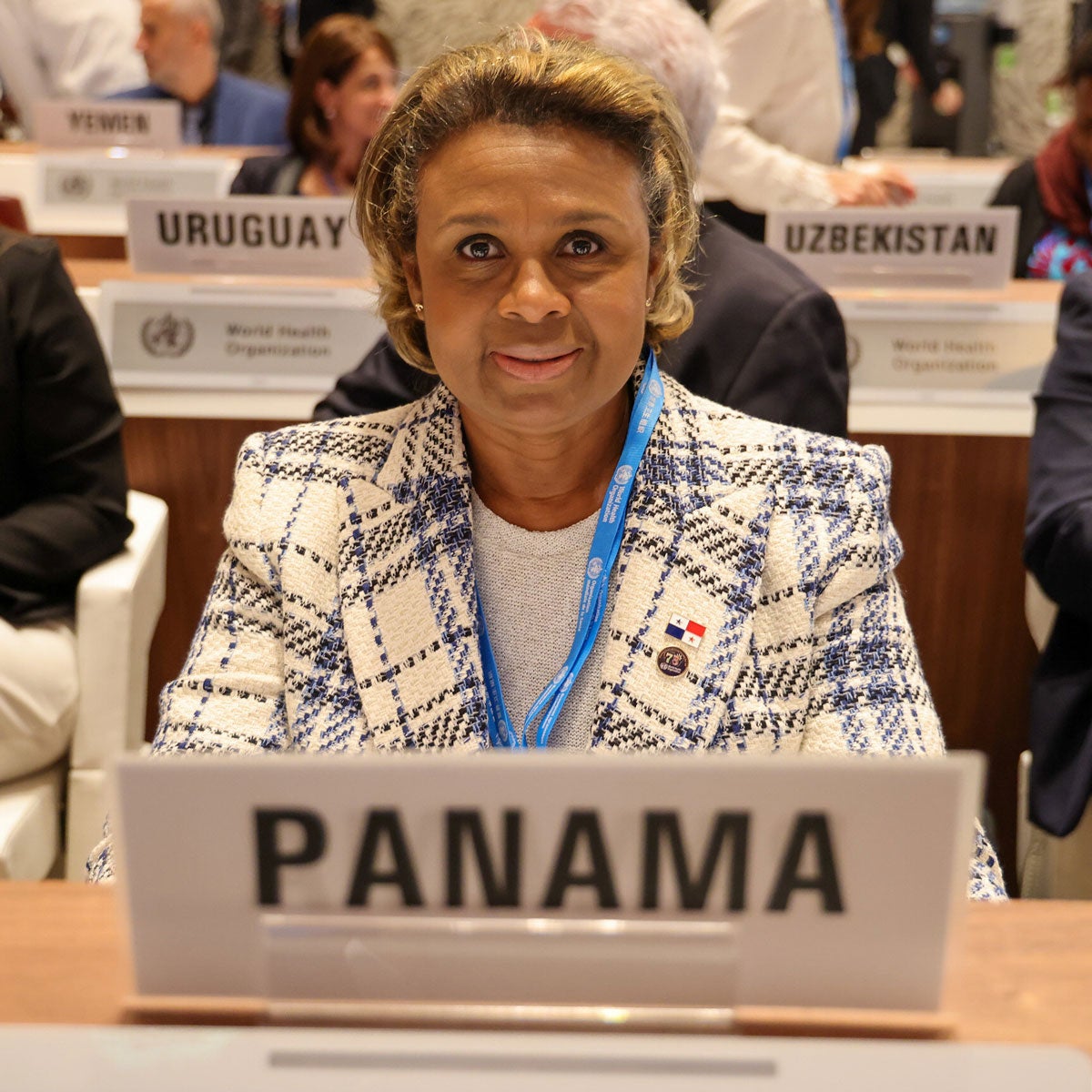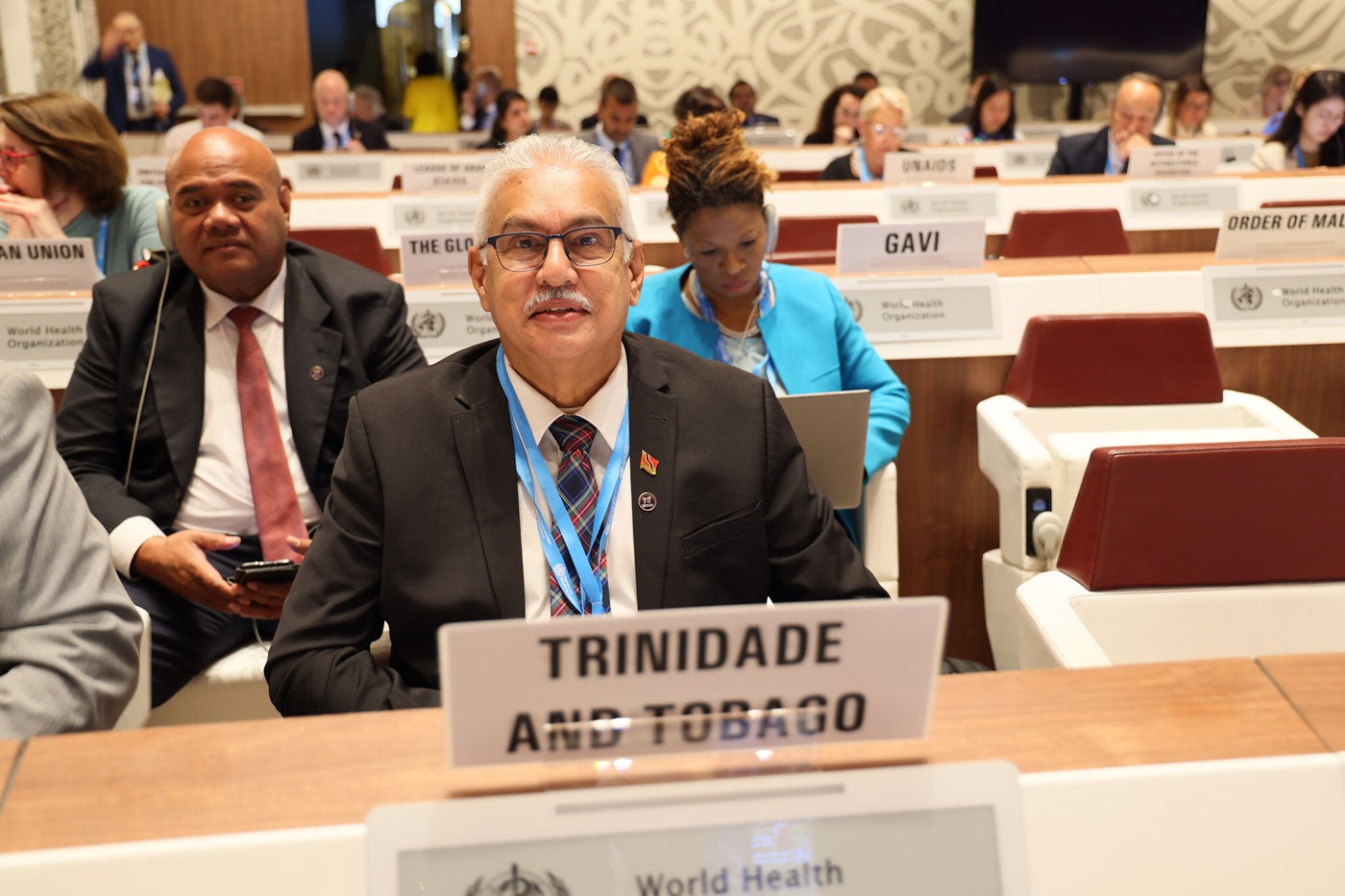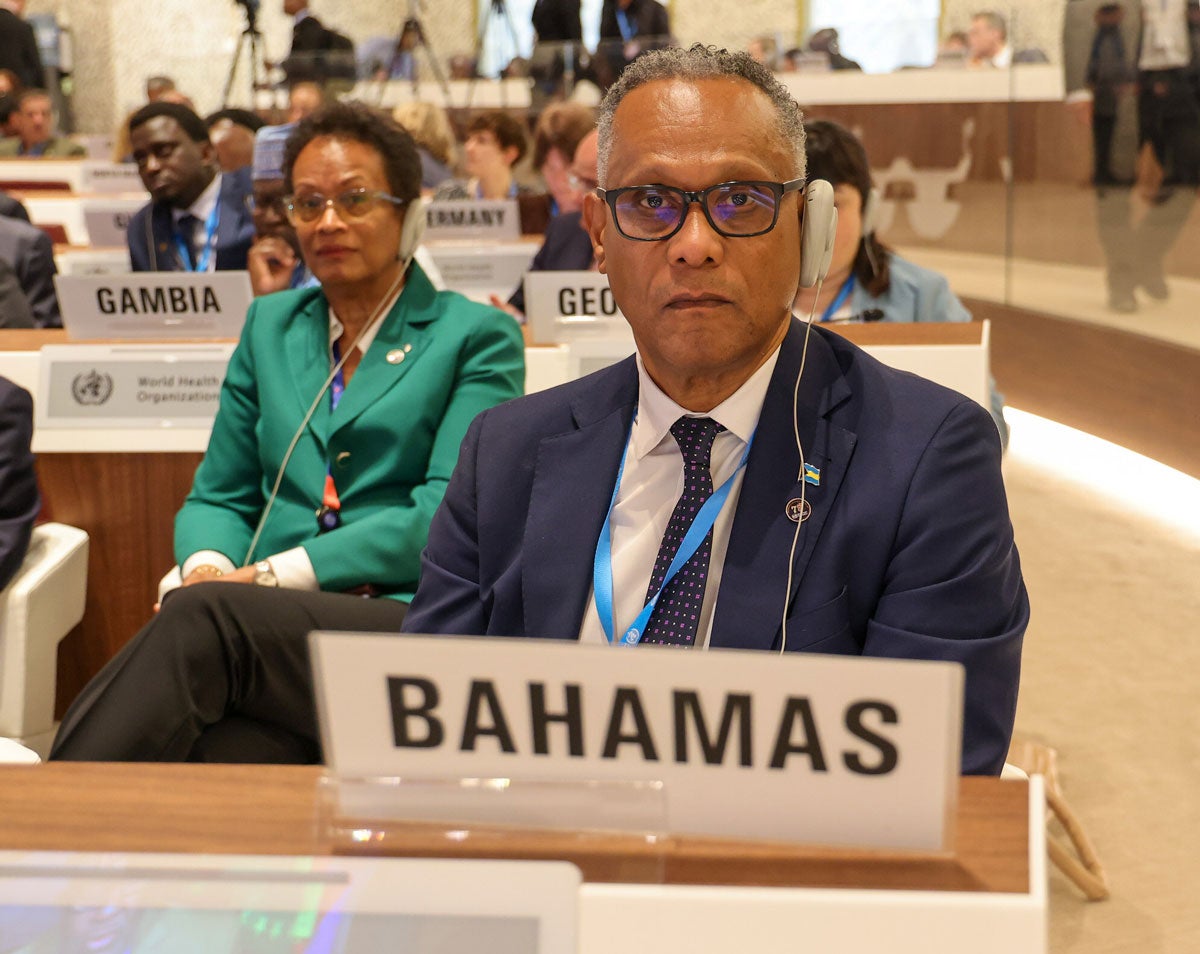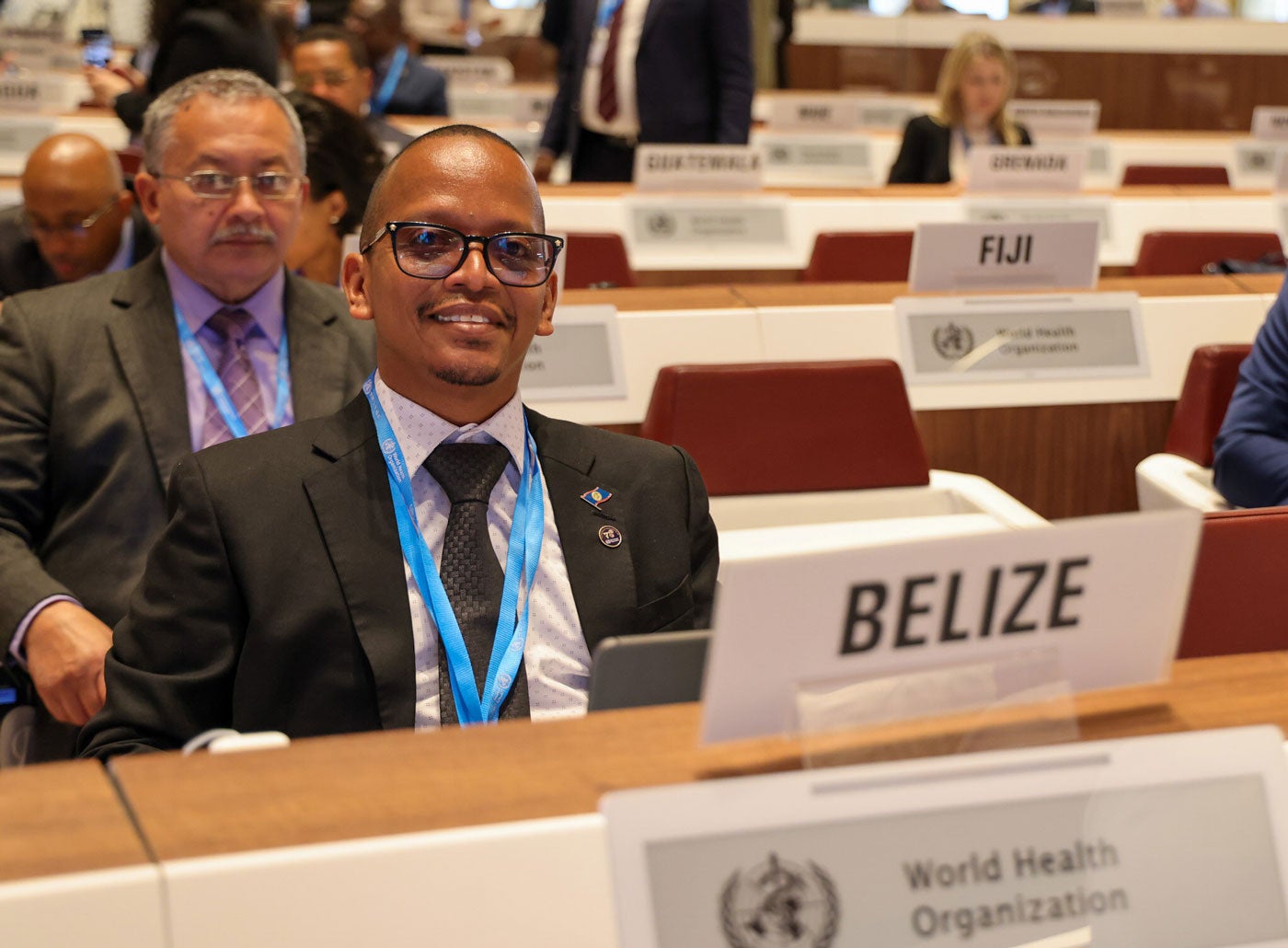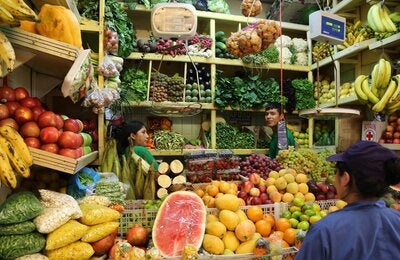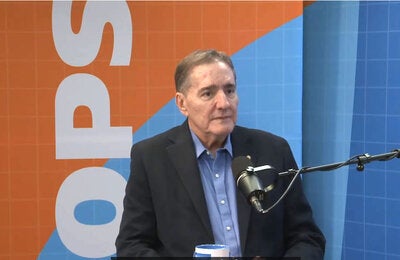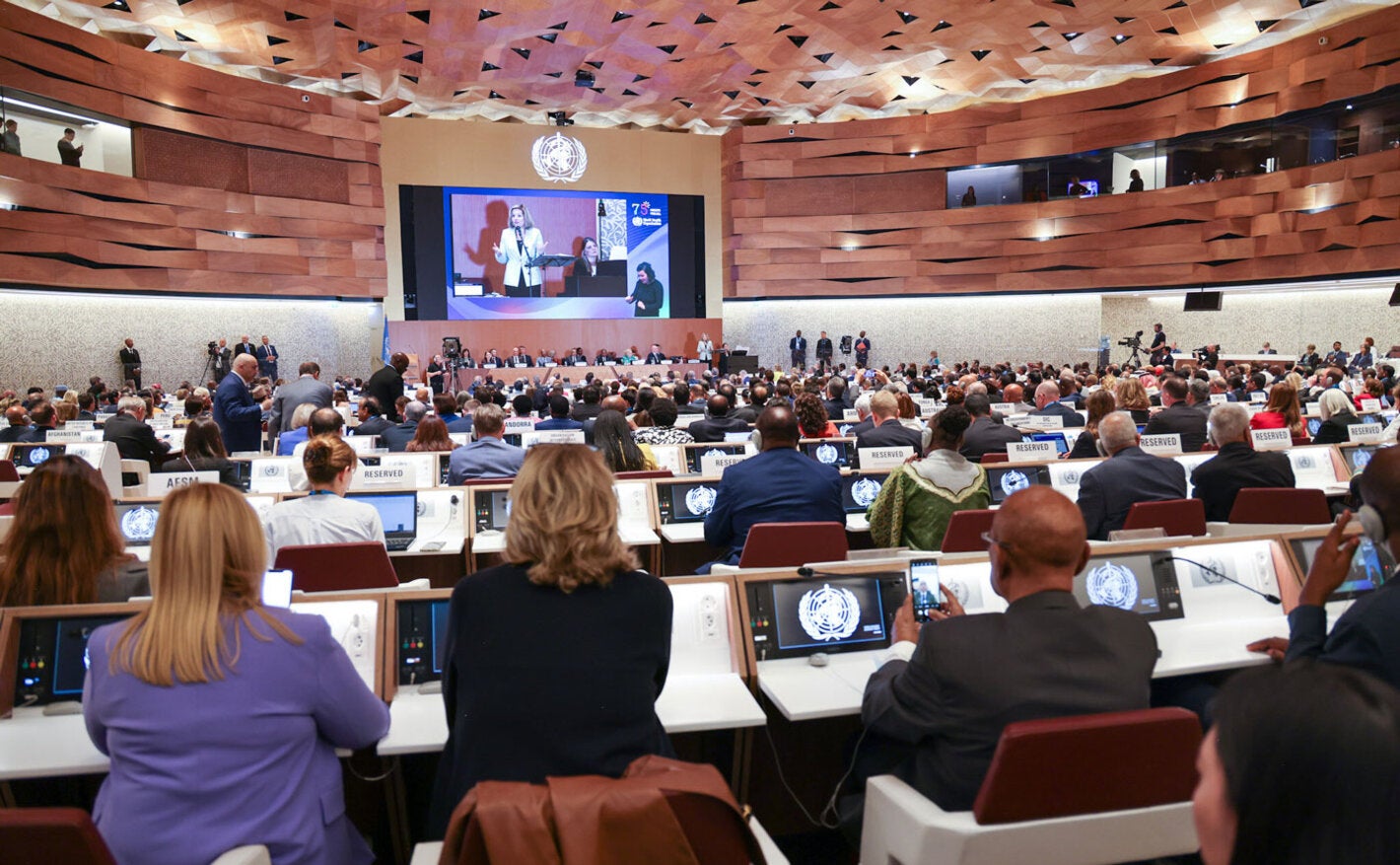
Geneva, May 23, 2023 (PAHO/WHO) – Ministers of Health and high-level delegates from the Americas addressed the World Health Assembly this week in Geneva, Switzerland, where they reviewed the topic of health in the aftermath of the COVID-19 emergency, highlighting lessons learned and considering actions for better preparedness against future health threats, including their position on the future pandemic instrument being discussed at the meeting this year.
Below some highlights of their interventions:
Argentina: Opportunities are generated in the deepest crises
After congratulating the WHO for its anniversary and thanking its teams for helping countries confront COVID-19, the Minister of Health of Argentina, Carla Vizzotti, considered that the pandemic "made visible the challenges in achieving equitable access to critical inputs such as vaccines."
"If the pandemic left us with anything, it is the lesson that opportunities are created from the deepest crises," she stressed, adding that regional capacities to produce critical inputs were strengthened, including in Argentina, which was selected by WHO as one of the centers for the production of mRNA vaccines.
Minister Vizzotti acknowledged the work done to strengthen surveillance and genomic sequencing and said that Argentina was invited to join the leadership committee for the international pathogen surveillance network launched on Saturday during the Assembly.
"We have the opportunity and the unavoidable responsibility to sustain health as the central axis of the political agenda – this requires even more multilateral and regional integration, more cooperation, more development, but above all, more solidarity and more empathy," she stressed.
The Minister of Health also shared the country's progress in regulatory frameworks against non-communicable diseases, including a bill sent to Congress to ratify the WHO Framework Convention on Tobacco Control and efforts to control tuberculosis and antimicrobial resistance.
Brazil: National health systems better prepared for emergencies to come
Brazil's Minister of Health, Nísia Trindade, stressed the need to have "national health systems that are better prepared for the emergencies to come.”
Dr. Trindade urged countries to learn from the lessons of the pandemic that "left six million dead in the world, 700,000 of which were in Brazil, with a great impact on the health system, mental health, the economy and the social fabric in general."
"Brazil is back: we are resuming our agenda in defense of health equality, a culture of peace and multilateralism," she stressed before the World Health Assembly in Geneva.
The Brazilian Health Minister considered that the world needs to "strengthen surveillance and health systems in general," as well as "redouble efforts in innovation, technology transfer and financing" to advance towards more equitable health systems.
"We must decentralize the production of medicines, vaccines and other strategic inputs to ensure equitable access to everyone," she said, and called for work to "reduce inequities, including inequality in access to the benefits of scientific and technological knowledge."
For Minister Trindade, strengthened multilateralism will be important. "We will not achieve these objectives without a reform of the global health architecture." In addition, she considered that for the new instrument on pandemics to be successful, "we must create a stronger health diplomacy, based on the principles of equality and solidarity."
Peru: Countries still facing the devastating consequences of the pandemic
Ambassador Luis Chuquihuara, Permanent Representative of Peru to the United Nations in Geneva, said that, although COVID-19 ceased to be a public health emergency of international concern a few days ago, "countries are still facing the devastating consequences of the pandemic on their health systems."
"Other diseases such as dengue fever and natural phenomena such as the coastal El Niño, which recently affected the north of Peru, continue to test and affect numerous health facilities in our country," he said.
Chuquihuara considered essential to strengthen the international health architecture, particularly to prevent future pandemics. "Peru is convinced that the new international treaty - to face future pandemics - should have as its main pillar the principle of equity, which will guarantee universal access to medical tools such as vaccines without discrimination or privileges," he stressed.
The Peruvian Ambassador also said that his country has submitted to the 76th World Health Assembly, together with a group of countries, a draft resolution on the impact of chemicals, pollution and waste on human health. He noted that pollution is considered by the United Nations as one of the three planetary crises affecting humanity, disproportionately impacting developing countries and countries vulnerable to natural disasters.
"Peru will continue to support the strengthening of multilateralism and the WHO, and will constructively support efforts to strengthen global, regional and national capacities for preparedness and response to health emergencies and future pandemics," Chuquihuara said.
Chile: Increasing solidarity and multilateral cooperation is essential
Chile's Minister of Health, Ximena Aguilera, stated that the COVID-19 pandemic "reshaped the global health landscape and showed the interdependence between health security and economic security.”
According to Aguilera, "the crisis also exposed the enormous inequities that exist between States and within countries, which were reflected, for example, in the unequal availability and distribution of vaccines during the emergency.”
"It is therefore essential to increase solidarity and multilateral cooperation and Chile is committed to this, as well as to improve preparedness, prevention and response capacities for health emergencies both globally, regionally and in each one of our countries with the WHO at the center of this process," she stressed.
Minister Aguilera pointed out that Chile has set three priorities to address the direct consequences of the pandemic, as well as to tackle structural problems related to the lack of equity and justice in access to health: to recover the capacity of health services and reduce waiting times; to address the mental health of the population that "is severely affected"; and "to advance in guaranteeing the right to health by building a fair and dignified health system.”
"Chile is moving towards universal health coverage based on primary health care with universal and free access," she said. "At the end of the Government’s mandate, the aim is for PHC to be universal in half of the country's municipalities. In addition, all public hospitals have been made free of charge for their users, who represent 80% of the population, reducing out-of-pocket expenses," she added.
El Salvador: When there is vision and political commitment at the highest level, the most complex challenges are overcome
After highlighting "the optimism in overcoming the COVID-19 pandemic," the Vice Minister of Health Management and Development of El Salvador, Dr. Carlos Alvarenga, affirmed "the importance of having a global vision with health as an imperative in the international development agenda and as a common good for humanity.”
Dr. Alvarenga thanked WHO for the support provided to El Salvador during the pandemic. "We are the best example that, when there is a vision and political commitment at the highest level, the most complex challenges can be overcome," he said.
According to the Salvadoran Deputy Minister of Health, the pandemic has taught them "the importance of strengthening the health system through the development of comprehensive health networks, modernization of infrastructure and equipment, strengthening supply chains and equipment, epidemiological intelligence, use of new technologies, development of human resource competencies, and digital transformation as a springboard to improve the quality of health services."
"Our goal is to continue transforming the healthcare system to achieve sustainable wellbeing that guarantees a better future for the next generations," he said. "Let us continue to work together to guarantee the right and access to health for all humanity," Dr. Alvarenga pleaded before the 76th World Health Assembly.
Canada: Addressing the pandemics of mental health, substance use and gender-based violence
Canada's Minister for Mental Health and Addictions, Carolyn Bennett, said that the lessons from COVID-19 "reaffirm the need to work with international partners to reduce barriers to health and care, but also to address the parallel pandemics of mental health, substance use and gender-based violence."
On the 75th anniversary of the World Health Organization, Bennett considered that we need the organization's leadership today more than ever, and recalled the words of the WHO’s first Director-General, Canadian psychiatrist Brock Chisholm, who said that "without mental health, there can be no real physical health."
The Canadian Minister highlighted the improvement in the collection of information during the pandemic, something that made possible to know the status of vaccinated, hospitalized and deceased people in real time. "Now we need to build on that improved information to achieve better community health indicators and have real-time data to address the continuing inequities in access," she said.
"We need to listen to science, to communities and to those with lived experience,” she added. "The very difficult last few years have highlighted how important today's lessons learned will be in enabling us to succeed in preventing, preparing for and responding to a future crisis." Bennett added that Canada is supporting efforts to update the International Health Regulations (IHR) and to develop an international pandemic instrument, as it is “crucial to develop a global health community where everyone is included and participates in a meaningful way."
Ecuador: Working for health is a collective responsibility
The Minister of Health of Ecuador, José Ruales, considered that WHO "is essential to have a positive impact on health governance," as well as to prepare Member States to "better respond to possible disasters or pandemics and to face other health challenges."
"Working for health is not the individual responsibility of a country, but a collective one that must unite various actors at the local, regional and global levels, which is why we promote South-South and North-South cooperation, multilateralism and regional integration, especially in the Americas and in the Andean Area," he said.
Dr. Ruales called for countries to "continue to work collaboratively and in solidarity at a global level for health.” He highlighted that "the road traveled over the last 75 years with WHO and 120 years with PAHO has been worthwhile” and that the “advances have been important, but there is still a long way to go to achieve health for all.”
The Ecuadorian Minister of Health also highlighted the 10-year health plan promoted by his country. He pointed out that the government defends equality in health, which is why Ecuador is working on strategies to tackle chronic child malnutrition and gender violence.
He also said that Ecuador is working to "improve the living conditions for the population to keep people healthy" and promote disease prevention.
Dr. Ruales noted that the country is working to improve timely and quality care, and highlighted that, in this regard, they are promoting digital transformation, intercultural health and community mental health.
Guatemala: Multilateralism has allowed us to achieve significant advances in health care
Guatemala's Vice-Minister of Primary Health Care, Dr. Edwin Montúfar, highlighted that the world has moved into a post-pandemic phase for COVID-19, an emergency that "introduced new challenges to public health at a global level."
On the 75th anniversary of WHO, Dr. Montúfar considered that "multilateralism has allowed us to achieve significant progress in terms of health, however, we continue to face health crises compounded by armed conflicts around the world."
During his speech, the Guatemalan Vice-Minister listed some of the advances in health in his country, including the deployment of comprehensive health care and nutrition brigades to combat malnutrition.
"Due to Guatemala's intercultural nature, we face the challenge of providing culturally relevant health care. To this end, we are working hand in hand with more than 19,800 midwives to respond to the needs of indigenous peoples," he said.
He also pointed out that his country has begun to offer care for non-communicable diseases at the rural level, and that, through the National Digital Health Strategy, Guatemala has brought telemedicine to some local communities. "Care for preventable diseases is a priority," Dr. Montúfar said.
United States: Let us commit to reaching agreement on the future pandemic instrument
U.S. Secretary of Health and Human Services Xavier Becerra called on delegates participating in the 76th World Health Assembly in Geneva to commit to "reaching agreement on both the pandemic instrument and amendments to the International Health Regulations (IHR) in the coming year."
"Let us seize this moment and regain momentum to achieve our global health goals, embrace mutual aid and work collectively for peace, health and equity for all," he said.
On the 75th anniversary of WHO, Becerra considered that the Organization "represents our shared values and remains vitally important in the global struggle for health and well-being". He remarked that "President Biden and the United States are fully committed to the WHO.”
The U.S. Secretary said that the world faces "common health problems that require shared solutions." Among these, he cited maternal mortality, cancer, infectious diseases, behavioral change, substance use disorders – especially synthetic drugs – and climate change.
"The next pandemic is never far away," he warned. "We have joined forces in the past to achieve bold goals and address threats, and we have succeeded. We can do it again," he said.
Cuba: More than ever, humanity needs resilient health systems
Cuba's Minister of Public Health, José Ángel Portal Miranda, said that the world should look at the WHO anniversary "as an opportune moment to analyze challenges and perspectives in order to continue to improve health for all.”
"What we have experienced in recent years shows that, more than ever, humanity needs resilient health systems that guarantee the right to health for all, and the fulfillment of the Sustainable Development Goal (SDG) related to health," he said.
Portal Miranda considered it important to carry out "special monitoring" on the effects of climate change "to address and minimize the risks of social determinants that may have an impact on the emergence of new health emergencies."
"Public health in Cuba is a right for all people, and it is the responsibility of the State to guarantee access, free of charge, to quality care, protection and recovery services," said the Cuban Minister of Health. "On this base, we found strengths to successfully face COVID 19."
Portal Miranda detailed that the health management of the pandemic in Cuba "was based on access to innovative medicines, the result of which was the further development of the Cuban biopharmaceutical industry.” The country carried out "an unprecedented national vaccination campaign that made it possible to immunize more than 98% of the vaccine-eligible population over 2 years of age," he said.
"Strengthening and improving health systems are challenges that we are obliged to work on in order to enable real access to health services for people," he said.
Dominican Republic: Time to design new initiatives to address future pandemics and emergencies
The Vice Minister of Collective Health of the Dominican Republic, Dr. Eladio Pérez, considered that the end of the COVID-19 emergency was "a milestone in global health," but stressed that "the pandemic is not yet over, and that it is time to design new initiatives to face other pandemics and future health emergencies.”
Dr. Perez indicated that his country "is fully committed to adopting a strategic and institutional vision to ensure that policies respond to the needs of our population", and that they have developed the "Ruta de la Salud" strategy, which includes a comprehensive approach to promote healthy lifestyles.
Among the achievements in health of the Dominican Republic, the Vice-Minister highlighted: "98% of the population has social security, free access to innovative treatments against COVID-19, a 100% increase in the amount of coverage for catastrophic diseases, a 189% increase in the number of high-cost patients and a budget increase of more than 150% in our program."
Dr. Perez also pointed out that they have strengthened epidemiological surveillance for the "efficient control of epidemics such as cholera and smallpox, with the support of PAHO.” They also allocated a special budget for a new school health program and are elaborating a mental health initiative that offers free telephone assistance.
The Vice Minister underlined his country's commitment "to continue to work with the support of PAHO and other actors to advance towards the goal of health for all.”
Colombia: Ensuring the right to health with more equity
Colombia's Vice Minister of Public Health and Service Delivery, Jaime Urrego, stressed the importance of ensuring affordable health services. "Because they deal with the fundamental right to life, health systems must be universal, public and free, so that access does not depend on people's ability to pay."
Urrego also stressed the need to support countries in facing climate change. "Climate change cannot be seen as a one-off issue, what we are witnessing is a real emergency. WHO and public health must be at the center of discussions to advance urgent adaptation and mitigation actions framed in climate justice."
The Deputy Minister also called for equity in health technologies to address new pandemics or emergencies. "Let us understand that intellectual property rights and the logic of pharmaceutical industries cannot be above the right to health. The real preparation for new health emergencies involves adjusting the rules of the game, so that not only the interests of a few are served. It cannot happen again that a pandemic ends and the concentration of resources in a few territories implies the denial of access to millions of people", he pleaded.
Mexico: Working together to improve emergency preparedness
Ambassador Francisca Elizabeth Mendez Escobar, Permanent Representative of Mexico to the United Nations in Geneva said "together we have contributed to life-year increases, the reduction of child mortality and the eradication of smallpox. Together we have also worked to control neglected tropical diseases, limit tobacco use, and overcome the H1N1 and COVID-19 pandemics, among many other things. These advances are an example that solidarity and international cooperation are indispensable components in addressing the health challenges of our time."
The Mexican Ambassador stressed that, despite the achievements in WHO’s 75-year history, much remains to be done. "This anniversary coincides with a period of change and reflection. The COVID-19 pandemic revealed the fragility of our health systems, but also the limits of international coordination and of our multilateral institutions, including WHO. The lessons learned open up an opportunity to reformulate global health policy and strengthen this organization," she said.
For that, she added, "it is necessary for Member States to make new commitments to global public health and multilateralism, commitments that in our opinion must follow a social approach to promote global public goods, overcome all types of exclusion, promote harmony with the environment, and strengthen foundations in favor of access and solidarity."
Paraguay: Addressing inequalities and current emergencies
Ambassador Marcelo Scappini Ricciardi, Permanent Representative of Paraguay to the United Nations in Geneva, highlighted the health reforms in his country. "The reform of the national health system is our priority. The guide for the implementation of healthy environments and the general human resources policy are tools to improve health conditions for our various population groups and territories," he said.
Scappini Ricciardi also recalled the health threat Paraguay is currently facing, such as the Chikungunya epidemic. "We talk in the future tense about future pandemics and forget the many emergencies that put health systems at risk still give us no respite. In my country, where dengue has been historically endemic, we are going through a complex epidemiological scenario. We are experiencing the worst Chikungunya epidemic in our history, one of the largest in South America", he stressed.
The Paraguayan Ambassador highlighted the need to promote equity to face health emergencies. "Let's not wait for a new pandemic to work in a spirit of solidarity to face health emergencies that destroy health systems. Trust in multilateralism will be restored with concrete actions to strengthen preparedness and response to public health threats and emergencies," he said.
"Paraguay will continue to participate in the negotiations for the future pandemic instrument and strengthening the IHR, both of which should embody the special needs of countries with different levels of development and ensure the equitable, effective and timely circulation and access to supplies for countermeasures, medical products, goods, services and technologies," he said.
Costa Rica: Science, cooperation to address health challenges
Shara Duncan Villalobos, Alternate Permanent Representative of Costa Rica to the United Nations in Geneva, underscored the role of science and cooperation in addressing health challenges.
"My country agrees that only through science, research and cooperation at all levels will we be able to address the threats to human health that arise in the context of health, such as new diseases or socioeconomic, political or legal barriers that prevent access to quality health services," she said.
Duncan Villalobos also highlighted the inequity in progress towards universal health in the world: "despite scientific progress, we have yet to make progress to ensure equitable access for all States and all people to therapeutic and health products, including medicines and vaccines.”
"Costa Rica reiterates the importance of strengthening primary care, health surveillance, health infrastructure and the full enjoyment of well-being in society as key aspects to achieve the highest standards of health in all its dimensions," she said.
The Costa Rican representative also stressed her country's support for multilateralism. "We reiterate our unconditional support to the valuable work and guidance provided by WHO, and our regional partner PAHO, and look forward to continuing to contribute to the achievement of health for all, without exception."
Nicaragua: Attention to the Sustainable Development Goals (SDGs)
The delegate of Nicaragua recalled his country's health efforts, challenges and achievements in recent decades, also during the COVID-19 pandemic. She underscored the need for cooperation and for more attention to meeting the Sustainable Development Goals, especially for health.
"We emphasize that, as the preamble of the constitution for this organization states, the health of peoples is a fundamental condition for achieving peace and security and depends on the broadest cooperation between peoples and States," she said. She added that “to this end, it is vital to continue working together for common objectives and without measures that hinder progress or politicize the heart of this international organization."
Haiti: Equitable access to medicines at fair prices to promote international health security
Justin Viard, Permanent Representative of Haiti to the United Nations in Geneva, highlighted gains in health since the inception of WHO, along with challenges.
“Universal health coverage has been the goal all those years, and different resolutions have tried to get us closer to that goal. Undoubtedly, significant progress has been made in improving health systems, fighting against diseases and their determinants. Nonetheless, poverty and inequality persist. COVID-19 highlighted the structural challenges facing health systems around the world,” he said.
The Haitian Representative also reflected on the lessons learned from COVID-19, and called for more equitable access to face future emergencies:
“The COVID-19 pandemic surprised us and revealed the limits of our global health architecture. It also reminded us that we are members of the same human family. We all live on the same planet. We share air, earth, oceans […] We all admit that no one is protected, no one is healthy, unless we are all protected, unless we are all healthy.
Countries like Haiti need universal and equitable access to vaccines, medicines and products at reasonable prices and that are safe and efficient. These are vital conditions for international health security and to protect future generations. We are committed to strengthening primary health care as part of a global effort.”
Barbados: Focus on recovering losses, tackling current challenges such as noncommunicable diseases
Dr J.X. Walcott, Minister of Health of Barbados, took stock of health gains and challenges facing the world post-pandemic.
“As we look forward to the post-COVID period in my country, we recognize that we have receded in some of the progress made towards achieving the SDGs. This is particularly so in the areas of immunization against vaccine-preventable diseases and on the management of NCDs. In addition, challenges like new and emerging infectious diseases, climate change and health, anti-microbial resistance and building resilient health systems now have to be vigorously addressed.”
He called for “a rethink of WHO’s strategic direction within the context of universal health care that promotes the empowerment of our citizens and communities to achieve better health outcomes.”
In addition, Dr,. Walcott highlighted plans to tackle current health challenges, and the upcoming high-level meeting to discuss health in the context of Small Island Developing States (SIDS). “Barbados, at this time, we are especially interested in the health of our children, particularly as it relates to the prevention and control of childhood obesity and the early detection and management of persons at risk from and living with NCDs, and problems of mental health. Barbados is also very pleased to host the high-level meeting for SIDS on NCDs and mental health. We look forward to a strong outcome document that would enhance the health of persons in small island developing states.”
The Minister of Health of Barbados further thanked PAHO for its support towards improving emergency preparedness. “We are pleased to receive technical expertise and support in the development of our health national adaptation plan. We appreciate the support received by the Pan American Health Organization and the Caribbean Public Health Agency in our efforts for future pandemic readiness through access to the global pandemic fund.”
Bolivia: An opportunity to establish equal partnerships for new emergencies
The General Director for Health Networks at the Ministry of Health and Sports of the Plurinational State of Bolivia, Dr. Vladimir Choquevillca, highlighted that his country achieved "control of COVID-19 through a strategy based on coordination between various levels of government, free mass diagnostics, genomic surveillance, voluntary and free vaccination, and the implementation of epidemiological surveillance and a control plan throughout the territory.”
This strategy, Dr. Choquevillca said, allowed Bolivia to reduce the lethality rate of COVID-19.
The Bolivian delegate considered that the world is now facing "an opportunity that should allow us to establish an effective, equal, and fundamentally equitable collaboration against new health emergencies."
Dr. Choquevillca stressed that "Bolivia recognizes and ratifies health as a human right" and "is working hard to implement a single, universal and free health system". He also reiterated the Bolivian Government's commitment "to the promotion and protection of public health and equity."
Uruguay: Humanity needs to avoid the health dysfunctions experienced during COVID-19
The Ambassador of Uruguay to the United Nations in Geneva, Álvaro Moerzinger, considered that "WHO's anniversary is a good occasion to evaluate and appreciate its achievements in seeking to improve the quality of life of the world's population and to review strategies that have not worked or had limited impact."
"As the COVID pandemic demonstrated, perhaps the most urgent task is to protect ourselves against the emergence of similar challenges," said the Uruguayan Ambassador. "We are convinced that humanity needs to avoid the health dysfunctions experienced during COVID-19," he said and stressed the "desirability of having a WHO with the capacity to design action protocols that unify prevention and response to prevent the unnecessary loss of human lives."
For Moerzinger, the negotiations taking place to update of the International Health Regulations (IHR) and towards the approval of an instrument on pandemics "are a sign that, even during difficult times, the international community still understands that problems that concern us all can be solved through cooperation."
To move forward, he said, "we must consider issues as diverse as the early detection of diseases and emergencies, equitable access to medicines and vaccines for all, a climate crisis that displaces people and increases the risk of new diseases, and neglected diseases and silent pandemics such as non-communicable diseases."
The Uruguayan Ambassador remarked that his country "continues to make progress in providing health services as efficiently as possible to its entire population," and acknowledged the "appreciated and valuable" contributions of PAHO and WHO in this regard.
Panama: End of COVID-19 emergency a testimony to how we can overcome challenges together
After recognizing WHO's contributions to public health over the past 75 years, Panama's Vice Minister of Health, Ivette Berrío, noted that "today we face new challenges that require our unwavering dedication and collective action to address emerging infections, the burden of non-communicable diseases, the impact of climate change on health and the need for equitable access to healthcare."
For Vice Minister Berrío, the recent WHO declaration that COVID-19 no longer constitutes a public health emergency of international concern "is testimony to how we can overcome this challenge together.”
"International cooperation through multilateralism played a crucial role in this achievement and we can move forward maintaining optimism and hope in science and health workers,” she said.
Berrío underscored "Panama's commitment to continue to join forces to promote a resilient health system and thus achieve a more prosperous world for all."
Trinidad and Tobago: Together to tackle the global NCD storm
The Minister of Health of Trinidad and Tobago, Terrence Deyalsingh, congratulated WHO for its 75h anniversary and reflected on the growing incidence of noncommunicable diseases, reminding delegates that NCDs “kill approximately 41 million people each year which creates approximately 74% of deaths globally.”
“We are in the NCD storm together,” the Minister said, pointing out how, for example, the tobacco industry uses aggressive marketing strategies and “vast budgets to target vulnerable teens and adults to smoke, after decades of research clearly revealed the correlation between smoking and premature morbidity.”
Apart from tobacco, he highlighted the problematic of increased fast-food consumption around the world, especially among young people. “Now there is also evidence detailing how multinational corporations are using similar aggressive marketing strategies to encourage the increased consumption of fast food by adolescents and children.”
The Minister called for urgent action against these forces. “We must be aware that global food companies have an influential impact on public health, and the enormous resources they direct towards marketing and branding of unhealthy foods and drinks, which has led to the exacerbation of NCDs among children, have now generated scrutiny of how food is marketed to this demographic.”
He finished with a plea for concerted action: “may I suggest that these megabrands reexamine the way they market to children and families, so that the parallel lung cancer crisis as well as the increasing risk of obesity – even among children - can be avoided, allowing us to prevent an explosive increased risk of NCDs and cancer.”
Jamaica: Prioritizing universal health coverage essential to face challenges
The Minister of Health & Wellness of Jamaica, Christopher Tufton, congratulated WHO on “75 years of growth and outstanding leadership in public health.”
He recalled the challenges we currently face: “the growing crisis of NCDs, including mental health problems, the worrying trend of low in immunization take-up, inadequate health care financing, the need for digitized health systems for resilience and the imperative of pandemic preparedness and response.”
Minister Tufton said that “together, these and other public health challenges make the prioritization of universal health coverage essential, including in developing countries, whose populations are faced with particular vulnerabilities.”
The Minster said that actions by Jamaica to strengthen health include primary health care reform, the digitalization of health systems, physical infrastructure upgrades as well as attention to human resources.
Minister Tufton said Jamaica is also “committed to working with working groups for the amendments to the IHR and in negotiations for a new pandemic treaty,” and in this regard called for interventions by the WHO Director General “on behalf of SIDS to ensure there is an adequate time to make contributions bearing in mind our limited resources.”
“As we deliberate in the coming days, I trust that we will do so with an eye to identifying the synergies and to forging partnerships that can stand the test of time and public health emergencies as we save lives and realize health for all,” the Minister concluded.
The Bahamas: Calling attention to the challenges faced by SIDS, especially climate change
Dr. Michael Ronald Darville. Minister of Health and Wellness of the Bahamas called attention to the challenges faced by small islands developing states (SIDS).
“As an archipelagic nation, the Bahamas has to spread health infrastructure across a wide network of islands in order to serve scattered population centers. Our very geography has posed a threat to health equity,” the Minister said.
“Despite this challenging reality, we are doing our utmost to ensure our citizens have access to proper health care as they truly deserve,” the Minister said. This includes upgrades to more than 50 clinics and plans to construct two state-of-the art hospitals, as well as legislative changes “to improve the delivery of health care services to our complex ecosystem.”
He also highlighted the Bahama’s advances to tackle mental health: “we also brought into force a new mental health legislation that is finally modernizing pediatric and adult mental health care services across the country.”
Minister Darville brought attention to the impacts on climate change to this country, which is particularly vulnerable to weather events. “We are constantly bombarded by hurricanes and tropical storms,” he said, adding that “these natural disasters play a significant role on our country’s healthcare infrastructure and rob of us of the ability to fully channel scarce resources towards social reform and health services."
“The mental, social and economic fallout left behind in the wake of the devastating effects of climate change reinforces my country’s commitment to WHO’s global agenda to promote economic recovery and the revitalization of healthcare service delivery through universal health coverage,” he added.
He noted that, while the Bahamas strives to improve and upgrade health delivery systems, the country remains vulnerable to the destruction brought on by climate change. “The reduction of the global carbon footprint is therefore vital to sustainable health care models for SIDS like the Bahamas.”
St. Vincent and the Grenadines: Engagement to tackle NCDs, attention to mental health and in retaining healthcare workers
The Minister of Health, Wellness and the Environment of St. Vincent and the Grenadines, St. Clair Prince, acknowledged “the tremendous lifesaving work of WHO for three-quarters of a century.” He added: “the dedicated and extensive support provided to all of us during the last four years has proven the value and relevance of this great institution.”
The Minister said his country believes strongly that the role of WHO over the next 25 years must be to save lives by driving health for all. To fulfil this mandate, he said, “we must work together.”
He added countries must “continue to strive towards enhanced health emergency management capacities" and strengthen national, regional and international health security mechanisms "informed by the evidence gathered in the last four years."
He further highlighted the important role of communication: “St. Vincent and the Grenadines understands the critical importance of sustained risk communications, coupled with community engagement, to maintain our many public health gains, including our greater than 90% childhood vaccination coverage.” The Minister added that his country is looking forward to ongoing support as it “further develops its RCCE capacities to strengthen us in our battle against the NCDs epidemic.”
The Minister considered the impact of mental health and said the country is currently doing an extensive review and working with PAHO/WHO “in the development of an integrated mental health and psychosocial system better suited to our peculiar Vincentian context.”
Minister Prince concluded by calling attention to the challenge of building and retaining a health workforce, saying his country’s sustainable development goal gains were under threat “because of the alarming loss of our most experienced healthcare workers to stronger economies we cannot compete with.”
“When 10% of your registered nurses leave in one year, wards cannot be staffed, basic services cannot be provided, and our people suffer,” he said, asking WHO to “increase its advocacy for the protection of the most valuable resource of our healthcare systems.”
St. Lucia: Our duty to bridge health gaps and ensure no one is left behind
The Minister for Health, Wellness and Elderly Affairs of St. Lucia, Moses Jn. Baptiste, highlighted the need to strengthen health systems beyond the COVID-19 emergency.
“Today, as we recover from the devastation caused by COVID-19, the importance of universal health care has never been more apparent. The global health crisis tested the resilience of countries and strained health care systems. It claimed too many lives,” he said.
“As we continue to recover from these challenges, it is critical that we remain steadfast in our commitment to achieving health for all,” the Minister said. “This pandemic has exposed the fault lines in our health care systems, revealing stark inequalities. It is our duty to bridge these gaps and ensure no one is left behind.”
He stressed that St. Lucia is committed to that goal, however the country cannot do this alone. “None of us can do it alone. We must forge partnerships and harness the collective wisdom and resources of the international community,” the Minister said.
“Together we can save lives and drive health for all. Let us be unwavering in our commitment, bold in our actions and compassionate in our resolve,” he said.
The Minister closed by calling for an inclusive debate: “in this health for all imperative, there are no small or large countries, we are all in this together.”
Venezuela: A nation ready to contribute to the construction of a new healthcare reality
Venezuela's Minister of Health, Magaly Gutiérrez, stressed that her country is "committed to a solid and robust health system."
"Our government has not strayed from objectives and plans such as the Millennium Development Goals, and now the 2030 Agenda. As a member country we have taken it onboard, executing necessary actions with creative effort and resilience," she said.
The Venezuelan minister said that much has been achieved and surpassed by her country towards these goals, and that "we will also achieve the pending ones, because we are a country that faithfully complies with these agreements."
"You have in Venezuela a respectful nation ready to contribute to the construction of a new reality in the field of health," Gutiérrez stressed while addressing the World Health Assembly.
Belize: Technical cooperation to address present and future challenges
“Our region faces unique challenges, compounded by poverty, inequity and limited resources. However, we are committed to theme of this year’s assembly: saving lives, driving health for all,” said the Minister of Health and Wellness of Belize Kevin Bernard.
Challenges such as human resources for health, increase in NCDs, difficulties in obtaining vital medications and vaccines, along with the many detrimental effects of global warming, all continue to plague the Caribbean sub-region, he added.
The Minister said that COVID-19 highlighted the importance of investing in health and the achievements of his country in tackling the pandemic. “We are proud to have one of the highest vaccination rates in the sub-region, with over 55% of our entire population vaccinated."
He also said Belize “has made great strides over the last year as we move forward towards certification of being malaria-free and toward achieving the elimination of mother-to-child transmission of HIV and syphilis.”
Turning to climate change, the Minister said that Belize is still feeling the effects of hurricane Lisa, which battered the country in November 2022. He said building resilient and SMART health facilities remain a priority, and recognized the “importance of technical cooperation in improving health outcomes,” underscoring that the country is committed to continue to work with partners, like PAHO.
St. Kitts and Nevis: Inclusion key to better preparedness
Dr. Sharon Archibald, Permanent Secretary in the Ministry of Health, said WHO “is an important part of the global architecture that support small developing states like St. Kitts and Nevis."
“We are grateful for the work done by WHO, PAHO and our very own regional organization CARPHA, who all played a vital role in helping us navigate the rough waters of the COVID-19 pandemic,” she added.
Many lessons were learned, the Minister said, "as the COVID-19 pandemic became the great equalizer, exposing the vulnerability of health systems globally,” and added that it also “served as a catalyst for inclusion and highlighted the need for a united response.”
Among the lessons learned and reinforced, was the importance of partnerships at all levels to achieve development objectives, particularly in the field of health care, Dr. Archibald stressed.
“We have been fortunate to rely on bilateral, plurilateral and multilateral bonds that we have forged throughout the four decades of our independence,” she said. “We are convinced that the global response required to address global health challenges, such as COVID-19, must be inclusive.”
She also highlighted the challenge posed by climate events, and said St. Kitts and Nevis is committed to building a SMART resilient hospital with the ability to withstand natural disasters.
“The frequency and intensity of hurricanes and other natural disasters demand that we build our resilience to mitigate the harmful effects of climate change. We support the Caribbean Action Plan on Health and Climate Change to protect our population.”
Antigua and Barbuda: Urgent action to eliminate cervical cancer
The delegate from Antigua and Barbuda congratulated WHO for the “excellent work it has done in the past 75 years in promoting health.”
She expressed Antigua and Barbuda’s concern about the high incidence of cervical cancer, the “second leading cancer in women, and the third leading cause of death from cancer in women in our country.”
“We are aware that cervical cancer is preventable and curable if detected early and adequately treated,” the delegate added. “The implementation of the WHO Global Strategy to Eliminate Cervical Cancer as a public health problem gives hope that by 2030 cervical cancer and its direct and indirect impact on women, their families and their countries, will be a thing of the past.”
She outlined the country’s efforts to tackle cervical cancer, including the launch of a national HPV vaccination program in 2018 and a HPV testing program piloted in five national clinics since September 2022, which the delegate said resulted in a “100% increase in the number of women screened yearly in primary health care.”
She added that, to ensure sustainability, Antigua and Barbuda was the first country in the sub-region to procure HPV tests through PAHO’s Strategic Fund. “With this and our additional efforts in HPV vaccination, we are confident that Antigua and Barbuda will be the first country in the Caribbean to reach cervical cancer global goals."
She concluded by urging countries to “commit or have a renewed commitment to eliminate cervical cancer as a global public health threat by 2030.”
Dominica: Renewed commitment to address longstanding NCD health challenge
"In Dominica, we fought the enemy COVID with everything we had, our vulnerabilities compounded since COVID arrived just two years after hurricane Maria destroyed our island, setting us back billions,” said Dominica’s Minister for Health, Wellness and Social Services Cassanni Laville.
In solidary to the people affected by COVID, the Minister said the government is committed to “resetting our health care system with more focus on primary and integrated health care to better address emerging realities.”
He said NCDs, however, continue to remain unaddressed, claiming 41 million lives annually. “We must execute swift and united responses. NCDs pose a direct threat to socio-economic development, too many people retire in their 30s not as millionaires, but as victims of this pestilence,” the Minister said.
He called for countries to “bear the weight of responsibility ascribed by the people we serve and transition into higher gear together, so no country is left behind,” as well as to “remain steadfast and squeeze the juices of innovation and efficiency to resolve competing priorities.”
He congratulated WHO for its leadership during the pandemic and made an appeal “for a renewed approach to the longstanding NCD threat, with stronger emphasis, greater urgency and visibility, and a united voice.”

